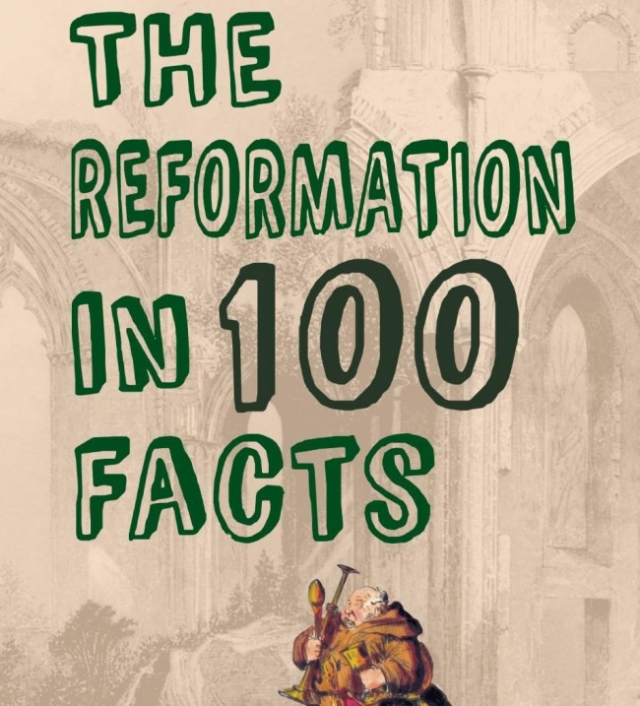The Reformation in 100 Facts
Book Review

The Reformation in 100 Facts, Dr Kathleen Chater, Amberley, 2016, paperback, £7.99, 192 pp, ISBN 9781445651347
The year 2017 marks the 500th anniversary of Martin Luther’s dramatic nailing of his 95 theses on indulgences denying the pope’s right to forgive sins on the church door at Wittenberg, which in itself is a complex enough package of concepts to unpack for twenty-first century students of whatever age group. Dr Kathleen Chater in this reasonably priced, punchy compendium of one hundred questions and answers rises admirably to the challenge, condensing as the publisher’s blurb plausibly contends ‘one of the great upheavals of the modern world into 100 easy-to-read, bitesize facts’, skilfully guiding the reader ‘through its turbulent history’. And so entry number eleven headed ‘Martin Luther Nailed Ninety-Five Theses to the Church Door in Wittenberg’ describes his action as ‘an iconic moment in religious history’ which has been reproduced in woodcuts, paintings, engravings, children’s picture books and even stained glass’ whilst advising that Luther’s protest ‘did not come out of the blue to Luther’s superiors and colleagues’, analysing his growing concerns during the period from 1510 to 1516 which culminated in Luther’s objections to the sale of indulgences to raise money to rebuild St Peter’s in Rome as an unacceptable ‘commercialisation of the road to eternal life’. She concludes that ‘most of the features of the well-known story that people generally believe are factually inaccurate’ maintaining for example that ‘the ninety-five theses were not complaints about the general state of the Church’ but more accurately ‘an academic examination of the doctrine of indulgences’ incorporating criticism of other teachings.
However, be warned that the author employs a number of devices, presumably, if unnecessarily, to further enliven her presentation which draw on card-playing metaphors such as ‘Politics Trumps Religion’, ‘Wildcards 1: Waldensians’ and Wildcards 2: Unitarians’. Moreover, other manifestations of the author’s lively sense of humour in titling her entries include ‘The Term “Holy Roman Empire” Is a Breach of the Trade Descriptions Act’, ‘The Diet of Worms was a Sixteenth-Century Weight-Loss Plan’, ‘Calvinists Are Tulip Fans’, ‘The Home of Dracula Became the Most Ecumenical European Country’ and ‘Protestants Burned Images, Catholics Burned Bodies’.
She contends, convincingly, that ‘the Reformation is one of the most important events in world history’, sparking ‘changes in beliefs that set off a chain of devastating wars in Europe, created the United States of America and still shapes the modern world, even in secular countries where Christians are in the minority’ and has covered a remarkably wide range of enquiries which will provide students introduced to her text with some promising discussion starters. These include carefully formulated statements, designed to provoke lively debate, such as ‘Without the Renaissance, the Reformation Would Not Have Happened’, ‘Without Gutenberg, the Reformation Would Have Failed’, ‘The Reformation had No Effect on the Catholic Church and ‘Women’s Position in Society Was Made Worse by the Reformation’.

